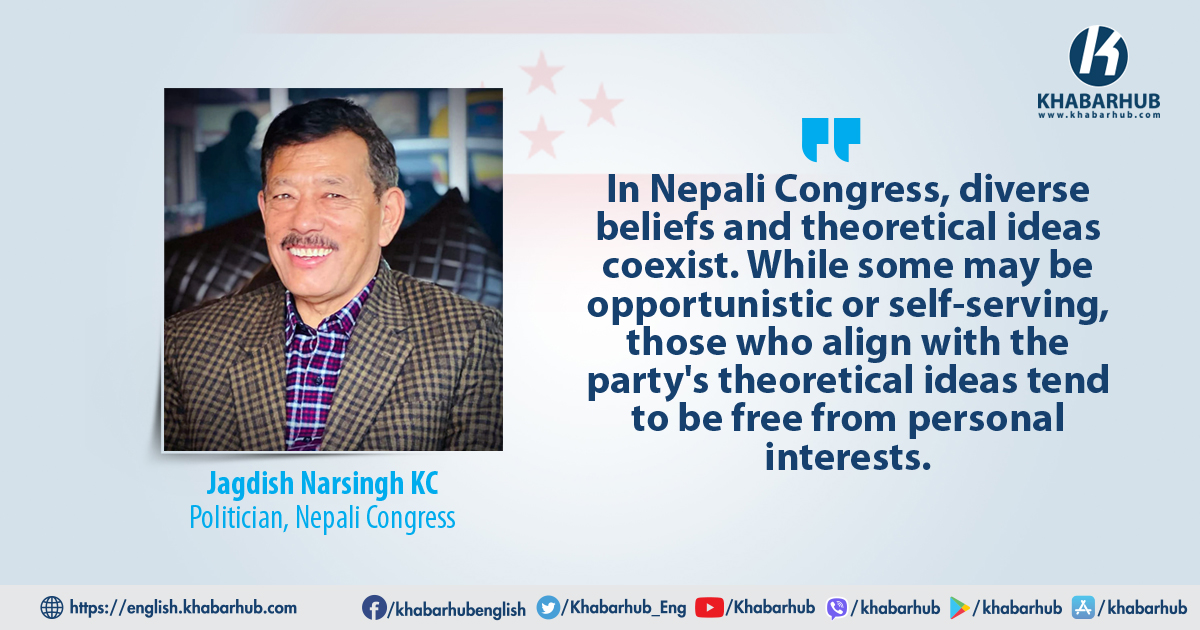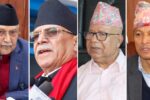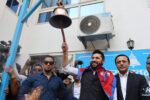KATHMANDU: Nepali Congress (NC) leader Jagadish Narsingh KC is a prominent figure representing the opposition within the party.
Standing at the forefront against the party’s leadership’s actions, he emphatically asserts that the Nepali Congress party will face increased challenges unless party President Sher Bahadur Deuba is replaced.
In an exclusive conversation with Krishna Timalsina for Khabarhub, leader KC shared his concerns:
Isn’t this absurd that the debate about the policy within the party like Nepali Congress, which has such a long history, has just started?
Indeed, the ongoing debate about the party’s direction and leadership authority is reminiscent of its long history.
We are currently in the midst of crucial discussions during the Mahasamiti meeting.
The agenda includes a comprehensive review of committee decisions, discussions involving current and former office bearers, executive committee resolutions, and proposed amendments to the bylaws.
Can you elaborate on the significance of the Mahasamiti meeting within the party structure?
The Mahasamiti meeting holds great importance as the highest body of the party, serving as the next highest authority after the convention.
It is here that we consolidate and pass conclusions on various issues that have a substantial impact on the party’s trajectory.
Looking back at the 14th Convention, do you believe adherence to party laws could have averted the current debate?
The 14th convention and the subsequent leadership decisions have indeed led to a turbulent political situation.
If the leadership had prioritized adherence to party laws and focused on the party’s expectations and goals, perhaps the current debate could have been avoided.
Moving forward, our expectations center around strengthening the party organization and preventing further distortion.
Could you shed light on the need for a ‘briefcase’ from the ward president to the top leadership?
The party’s current emphasis on obtaining positions and power has created a situation where a briefcase is considered a necessity.
If this trend is not curbed promptly, the party will inevitably face a crisis.
Our concern lies in the leadership’s apparent lack of focus on strengthening and advancing the party organization.
What is your perspective on the party’s cooperation with other political entities?
Founder leader BP Koirala’s advice not to cooperate with political parties one disagrees with seems to have been overlooked.
Today, we witness alliances with parties that do not align with our principles. The leadership seems more invested in eliminating dissenting voices rather than focusing on strengthening the party.
You mentioned reversing decisions from the central committee in the past. Can you elaborate on this?
Indeed. In the past, senior leaders like Ram Chandra Paudel and party President Sher Bahadur Deuba announced decisions in the Mahasamiti meeting, only to see them overturned by the central committee.
We advocate ending the practice of central members being ex-officio members of the Mahasamiti for life, and we plan to raise this issue in the upcoming Mahasamiti meeting for worker approval.
How do you view the presence of parallel forces and factions in party politics?
In the Nepali Congress, diverse beliefs and theoretical ideas coexist. While some may be opportunistic or self-serving, those who align with the party’s theoretical ideas tend to be free from personal interests.
However, the current leadership’s history of demanding percentages and engaging in power struggles raises concerns about the party’s unity.
Could you share your thoughts on the prevailing corruption and scandals in the country?
The pervasive corruption in the country demands attention from the Nepali Congress.
The leadership’s interactions with competitors in the past, coupled with the overall increase in corruption, underscores the need for the Nepali Congress to address and mitigate the growing discontent among the people.
How confident are you that the Mahasamiti meeting will be meaningful to bring the Nepali Congress into a pure rhythm?
We are quite optimistic about the upcoming Mahasamiti meeting playing a crucial role in restoring a sense of purpose and direction to the Nepali Congress.
The party has recently appointed leaders in 77 districts, but the expected impact hasn’t been realized.
To address this, we believe that every member of the party, from the grassroots to leadership levels, needs to undergo correction and improvement.
Can you elaborate on the impact of your conversion campaign in the provinces and districts?
Absolutely. We have successfully reached seven provinces and around 36-37 districts with our conversion campaign, urging every leaderless low-level worker to face a situation of renewal.
This campaign has injected renewed energy among our colleagues.
Regardless of how the party has been led thus far, the transformation campaign highlights the imperative for the party to evolve and better itself—an essential goal stemming from our 14th convention.
Our sincere efforts are directed at elevating the organization to its optimal state.
There was a debate on social media about general secretaries allegedly defying the Congress’ decision to bring Krishna Sitaula, who was defeated in the parliamentary election, to the National Assembly. What is your perspective on this?
The situation unfolded coincidentally. Following the National Assembly election, the Nepali Congress initiated the Congress campaign in the community, starting from Jhapa.
It happened that Krishna Sitaula, the former General Secretary of Nepali Congress, was elected to the National Assembly during this period.
The campaign had already commenced from Jhapa, where Sitaula was present. The people will be the ultimate judges, assessing the situation and deciding whether it was right or wrong.
Regardless of the election outcome, a leader remains a leader.
Is the timely explanation and analysis of any subject contingent on looking at the person’s face?
We have consistently emphasized the importance of questioning the selection of candidates for the National Assembly even before the actual process.
We advocated for bringing in individuals who are subject experts and providing opportunities to those who haven’t been involved within the party.
Unfortunately, when the dominance of decisions by party leadership prevailed, the current results became evident.
However, that chapter is now closed, and our focus is on the ongoing improvement and betterment of the party.









Comment